- Home
- Muriel Spark
The Golden Fleece
The Golden Fleece Read online
THE GOLDEN FLEECE
ESSAYS
MURIEL SPARK
Edited by Penelope Jardine
CONTENTS
Title Page
Preface
Part I. Art and Poetry
The Golden Fleece
The First Christmas Eve
Love
Ravenna: City of Mosaics
The Art of Verse
Ruskin and Read
Robert Burns
Andrew Young
Giacomo Manzù
The Desegregation of Art. The Blashfield Address to the American Academy and Institute of Arts and Letters, New York
The Wisdom of Mr T.S. Eliot
Ingersoll Foundation – T.S. Eliot Award
Pensée: T.S. Eliot
The Complete Frost
John Masefield
Decorative Art
Poetry and Politics
Emily Brontë
Part II. Autobiography and Travel
My Most Memorable New Year’s Eve
When I Was Ten
Pensée: Scottish Education
My Book of Life
Note on My Story ‘The Gentile Jewesses’
The Celestial Garden Party
What Images Return
Comment on ‘The Poet’s House’
The Poet’s House
Footnote to ‘The Poet’s House’
My Madeleine
How I Became a Novelist
The Writing Life
Living in Rome
Venice
Istanbul
Tuscany By Chance
The Sitter’s Tale
Italian Days
The David Cohen British Literature Prize, 1997
Part III. Literature
How to Write a Letter
Our Dearest Emma
Passionate Humbugs
Pensée: Biography
Fuzzy Young Person
The Brontës as Teachers
My Favourite Villain: Heathcliff
Mrs Gaskell
Mary Shelley. Proposal for a Critical Biography and Note
Mary Shelley: Wife to a Genius
Frankenstein and The Last Man
Shelley’s Last House
The Essential Stevenson
Robert Louis Stevenson
Celebrating Scotland
The Books I Re-Read and Why
London Exotics
A Drink with Dame Edith
Pensée: Miss Brodie on the Stage
The Short Story
Daughter of the Soil
Heinrich Böll
Eyes and Noses
Simenon: A Phenomenal Writer
The Book I Would Like to Have Written, and Why
Pensée: The Supernatural
Part IV. Religion, Politics and Philosophy
Testament of Faith
Ailourophilia
All God’s Creatures
The Sermons of Newman
Newman’s Journals
An Exile’s Path
A Sleep of Prisoners
Psychic Searchlight
A Pardon for the Guy
The Religion of an Agnostic. A Sacramental View of the World in the Writings of Proust
The Only Problem
The Mystery of Job’s Suffering
An Unknown Author
Man’s Estate
Kierkegaard
Karl Heim: Two Important Works
Letter from Rome: The Elder Statesmen
Ritual and Recipe
The Next World and Back
Publishing History
Part I. Art and Poetry
Part II. Autobiography and Travel
Part III. Literature
Part IV. Religion, Politics and Philosophy
Index of Names
About the Author
Also by Muriel Spark from Carcanet Press
Copyright
PREFACE
Good literary essays, in particular, have sustaining and stimulating qualities, like deep wells and clear rivers.*
Muriel Spark asked me to collect her essays, reviews, journalism, interviews, broadcasts, speeches, opinions – in other words, her prose writing – and make a selection for publication, while helping her with her other work: that is to say, keeping an eye on her books with publishers all over the world, business correspondence, card indexes and filing. (Her archive is extensive and mainly to be found in the National Library of Scotland, Edinburgh, and the McFarlin Library at the University of Tulsa.)
In the long-ago summer of 1991 Muriel rented a house for the month of July on the German island of Sylt in the North Sea, off Denmark. We drove up to North Schleswig and put the car on a double-decker open train, which raced out to the island on a causeway from Niebüll. Sylt is a popular holiday island, long and thin, with one side exposed to the elements with sand-dunes and cliffs; the other, landward side, faces a shallow inland water with a ribbon of sand inhabited by wading birds. Here, in Kampen, I spread out a lifetime of Muriel’s essays and reviews.
Little did I know then how many years were to pass before I would have sorted these down to a selection for this volume. Soon after this almost idyllic holiday, Muriel decided she must have a hip operation and that was the beginning of years of pain for her, operations to put things right which didn’t, and which took up all her days and nights and energy. What she did achieve in those following years was quite astonishing. She published her own volume of autobiography, Curriculum Vitae, in 1992 and, despite being in and out of hospital until 1995, she continued to publish and write. In 1996 she published a new novel, Reality and Dreams. She was to publish two more novels (Aiding and Abetting and The Finishing School) before she died in 2006.
Those latter years were, unfortunately, not as peaceful as they should have been: family problems and an unauthorised biography took away a lot of joy and undermined her courage. Her sense of adventure was not diminished, however, and we set off for long journeys by car to Spain, to Portugal, to Berlin, for congresses, British Council events and literary festivals.
In a 2003 interview, when she had just finished her last novel, Muriel said that she was going to concentrate on another volume of memoirs. She made notes and yes, she meant this then, but in fact her next book was to have been another novel, Destiny. I think she really was not inspired enough to write about herself and all the difficulties as well as all the joys of her life. She knew them all, they were past, they no longer interested her. Besides, she felt, as Graham Greene did, that as you went on your autobiography involved too many other living people. She really wanted to get on with the excitements of creation and the idea for a new novel nearly always crept into her dreams and devoured her attention.
Journalists demand to know ‘What is your favourite book?’, ‘Who is your favourite author?’, ‘What book would you like to have written?’, ‘Which writer do you admire most?’, ‘Who has influenced your writing?’ and so on. By nature, a writer’s journalism must contain a certain amount of autobiography. Some of Muriel Spark’s answers provided here to such questions reveal, I think, huge areas of her experience and idiosyncrasies, which are not to be found in essays on Cardinal Newman or reviews of C. Day Lewis’s poems. I hope that some of the short pieces and pensées in this volume will therefore, in some measure, fill the gap of Muriel’s unwritten memoirs.
So, after many interruptions, I sorted these prose pieces down to a selection of her thoughts on art and poetry, her autobiographical pieces and travel, her writings on literature and finally some mixed religious, political and philosophical essays and reviews. The outcome is a book which, I believe, tells many things, mainly about the author Muriel Spark, and I hope throws light on how she felt when young, in tune with t
he solitary sadness of the Brontës; how she was inspired as a writer and became a Roman Catholic from reading Cardinal Newman; how amused she was by some of the curiosities that came her way to review, such as Our Dearest Emma, the crazy Abbot Aelred (who is not included here) and the fashionable tattooist Professor Burchardt; her empathy with Mary Shelley waiting for Shelley’s boat to return to San Terenzo and her later struggle in London to support her son, Percy, so like Muriel’s own hard times, as, virtually, a widow or a single mother she fought to support her own son.
I would like to say here that the essay, often quoted by scholars, entitled ‘My Conversion’, published in Twentieth Century, CLXX, autumn 1961, was not an essay of Muriel Spark’s but an interview she gave to a priest, who wrote his own version of what she said in reply to his questions. They were not her own expressions: it was his essay, and it was his title. In fact she had nothing to ‘convert’ from. She embraced Christianity of her own free choice, first Anglicanism and then Roman Catholicism. Her family were mixed Jewish and Protestant and they didn’t object. Her father rarely went to the synagogue because, as a working man, he was working on the Sabbath. Her mother seems to have hedged her bets and had menorah, crosses and Buddhas, as well as a statue of the Venus de Milo for good measure. For them, what was good for Muriel was good.
I am struck, on reading the many essays and reviews of half a century ago, by the extent to which God and religion have now gone out of our daily lives. In the 1950s and 1960s it was natural that in any article, book or radio talk on the arts, literature, music, painting, and also science, these subjects would almost always be viewed or reviewed in relation to our inner spiritual values, with references to God, some deity at least, and religion in general.
I found that most of the pieces I selected fell into some sort of category, such as ‘Art’ or ‘History’ or ‘Travel’. Inevitably, there is a preponderance of writing which could be defined as ‘Literature’: essays on other writers, reviews of books, opinions on the classics. Muriel reviewed weekly for the London Observer for approximately ten years; consequently there are many short commentaries on books of the time with interesting titles that have entered the language, such as Not Waving but Drowning or The Loneliness of the Long-distance Runner. It was tempting to include these here for their charm, like credits in early films which ‘introduce’ Shirley Temple, Marilyn Monroe or James Dean. But they didn’t in the end quite merit selection.
I have begun this book with the essay titled ‘The Golden Fleece’, since it was one of Muriel’s earliest essays, published in 1948. The story of this ancient Greek myth must have appealed to Muriel’s early passion for the savagery of the Border Ballads and as a story it lacks none of the many dramas of life: love, adventure, adversity, betrayal, success, triumph, cruelty and loss. It is all there.
For the sake of avoiding repetition, I have had to omit a paragraph or two in some of the pieces, indicated by ellipses. Very occasionally I have added a missing word, indicating this with square brackets. In the case of certain essays where history has altered the truth of some statements, I have left the original text and provided footnotes. Some of the early essays probably do not incorporate recent scholarship, but I have included them for what they say historically.
Titles have been chosen according to my instinct. Muriel Spark’s own titles for her pieces were frequently changed by newspaper editors. Sometimes Muriel’s original title has prevailed, but not always, since the newspaper’s published title can be more appropriate. Occasionally I have given a simplified version in preference to either, such as just ‘Venice’ for ‘Venice out of Season’ or ‘Venice in Fall and Winter’. Even Venice has changed since those far-off days of 1981: every season is in season and you may no longer visit Venice without tourists.
It has been difficult to trace some of the many reviews from earlier days, their titles, publishers and dates. There are also some existing typescripts without provenance, telling nothing of whether they were ever published and if so when and by whom. And in one or two cases even Muriel herself was not sure whether she had written something or not and whether it was published. The information online is not entirely reliable either.
Fortunately Muriel kept her mind until the last day of her life and was always lucid. I asked her to look at most of the articles that have been included here and tell me whether she would like them published or not. She read them again, rejecting several and lightly touching up others for spelling, punctuation and meaning. I have tried to follow her instructions, which included ‘tick’, ‘OK’, ‘maybe’ or ‘perhaps’, ‘to be revised’, ‘omit’, ‘touch up’, ‘hold’, ‘combine’. These were quite easy to agree with, but of course I could not ‘touch up’ or ‘revise’. Some of these pieces are in the present book, un-touched-up and not revised. Others have been dropped.
Although I have sought to include a wide selection, I have eliminated many essays, and reviews in particular, on books or subjects which I suspect are no longer of general interest. I have here and there chosen a piece of writing which I think shows Muriel Spark’s thoughts on a subject of curiosity, such as ‘Cannibalism’ or ‘Tattooing’, or a reply to a question which shows an aspect of her life, such as ‘My Most Memorable New Year’s Eve’. Tattooing was at the time of writing less fashionable than it is today and a rarity outside of sailors’ dockside bars.
There arose the difficulty of placing an essay in a suitable category. Essays on subjects such as ‘Cats’ I feel instinctively belong to ‘Art and Poetry’, but are also suitable to be placed here under ‘Autobiography and Travel’. They might even be at home in ‘Religion’ or ‘Philosophy’. There is no end to where cats might not pop up.
Many of the early reviews mention ‘Mr’ or ‘Miss’ So-and-So, which now feels old-fashioned. In most cases I have changed this by omitting the titles and inserting first names.
Like her character Mrs Hawkins in her novel A Far Cry from Kensington, Muriel was always ready to help a friend with sensible and good advice. She was not over-influenced by other writers, but some certainly encouraged and inspired her: the Poet Laureate John Masefield for his narrative talent and charm; Cardinal Newman for his clarity of vision and exquisite prose; Max Beerbohm for his style and wit; Henry James for his wonderful stories and perspicacity.
Muriel Spark was a natural-born communicator: few people who saw her on stage at a reading or public event will have forgotten her wit and sense of irreverent fun. In 2003 she answered a journalist from Il Messaggero newspaper in Rome by saying, ‘It is my first aim always to give pleasure.’ In this she was similar to Nabokov, who also wrote with brevity and wit. In his Introduction to Nabokov’s Lectures on Russian Literature, Fredson Bowers specified that ‘the magic Nabokov felt so keenly in literature should be aimed at pleasure’. Even the literary critic Frank Kermode, in his Preface to Pieces of My Mind, wrote of criticism that ‘in paying tribute, or even when cavilling, … [it] must also give pleasure, like the other arts’.
Many students and fans have testified over the years to the way in which Muriel Spark’s books changed their lives. As a writer she was enormously hard-working and utterly dedicated, to the exclusion, often, of many passing distractions. This did not mean that she did not enjoy life greatly when it came her way, but that first and foremost came her work and she fought like a tiger to get this out to the world to read. Her work was truly a vocation for her. She took literature in a sense as a religion. She believed in her talent for writing and had plenty to say, so that she devoted herself to it as to a calling. In her essay ‘What Images Return’ she wrote: ‘Myself, I have had to put up a psychological fight for my spiritual joy.’
Muriel did not actually think of herself as ‘exiled’ from anywhere. The OED defines ‘exile’ as ‘penal banishment, long absence from one’s country, also figuratively, and a banished person (lit. & fig.)’. She was not banished literally or figuratively, and returned to Scotland to visit throughout her long life, but she did not live there
again or feel exiled from the life there. It was more a place of memory, where you have lived but no longer live, like visiting the past to which you are unable to return. She had a difficult life and her sharp wit, what John Updike once called her ‘sweet sting’, which she used to amuse and brighten people up, was her own courageous way of overcoming difficulties. None of her several biographers seems to have picked this up – neither her brave and generous spirit nor the optimism and joy of her personality, which I hope show in the autobiographical pieces.
Muriel Spark’s novels are fundamentally story-telling and, like the student in Vladimir Nabokov’s class at Cornell who was asked his reason for taking the course, I too join the course here ‘because I like stories’. So I start with a story, not a new one but an old, a very old one: the exciting story of Jason and the Golden Fleece.
Penelope Jardine
2014
*Muriel Spark, in her book choice, Sunday Telegraph Review, 30 November 2003 (Frank Kermode’s collection of essays, Pieces of My Mind).
PART I
ART AND POETRY
Art is an act of daring
The Finishing School
The Golden Fleece
One of the most interesting commissions ever entrusted to a goldsmith was that given to Jehan Peut of Bruges, in 1432, by the Duke of Burgundy, for twenty-five collars of the Order of the Golden Fleece. In the archives of Lille there still exists a record of 1080 livres received by Peut for his work. We can imagine with what pride he applied his skill to every feature and lineament of the insignia, which was to become the symbol of one of the most coveted Orders of Chivalry in Europe.
‘The golden fleece’ has had a mystical significance in the literature of the world since the third century BC. The story, although a familiar one, loses none of its charm in the re-telling. According to the old Greek legends, two young relatives of the King of Thessaly named Helle and Phrixus had so incurred the displeasure of their stepmother that she decided to kill them. She was prevented from doing so, however, by a golden ram with wings, sent by the gods to carry the boy and girl away. Helle fell off the ram’s back into the sea, now called the Hellespont after her. Phrixus came safely to land at Colchis, where he immediately sacrificed the ram as a thanksgiving to Zeus. The ram’s marvellous golden fleece he hung upon the branch of a tree, in a garden guarded by a fierce dragon.

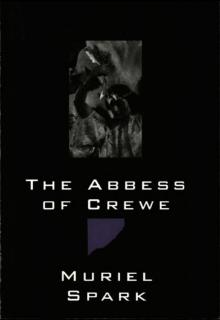 The Abbess of Crewe: A Modern Morality Tale
The Abbess of Crewe: A Modern Morality Tale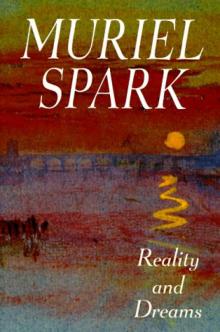 Reality and Dreams
Reality and Dreams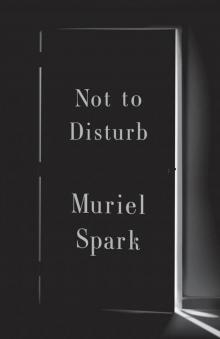 Not to Disturb
Not to Disturb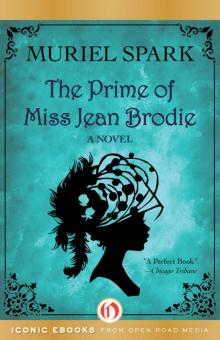 The Prime of Miss Jean Brodie
The Prime of Miss Jean Brodie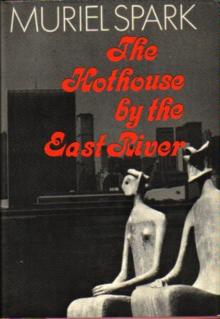 The Hothouse by the East River
The Hothouse by the East River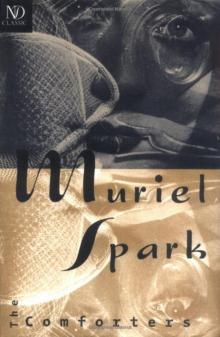 The Comforters
The Comforters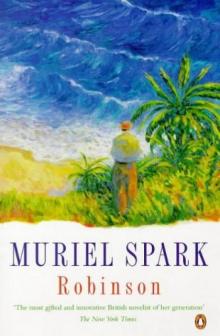 (1958) Robinson
(1958) Robinson Unknown
Unknown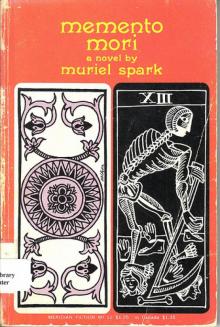 Memento Mori
Memento Mori The Finishing School
The Finishing School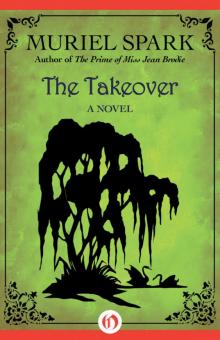 The Takeover
The Takeover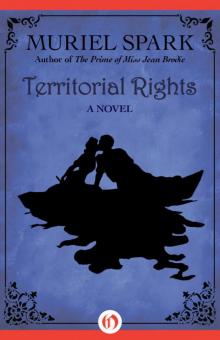 Territorial Rights
Territorial Rights The Complete Short Stories
The Complete Short Stories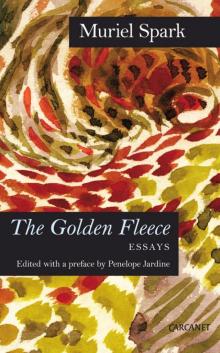 The Golden Fleece: Essays
The Golden Fleece: Essays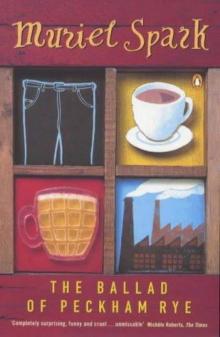 The Ballad of Peckham Rye
The Ballad of Peckham Rye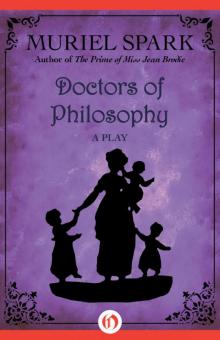 Doctors of Philosophy: A Play
Doctors of Philosophy: A Play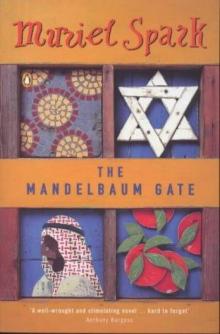 The Mandelbaum Gate
The Mandelbaum Gate Loitering With Intent
Loitering With Intent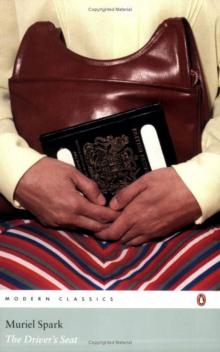 The Driver's Seat
The Driver's Seat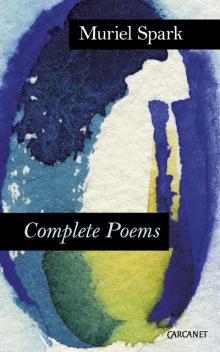 Complete Poems: Muriel Spark
Complete Poems: Muriel Spark Symposium
Symposium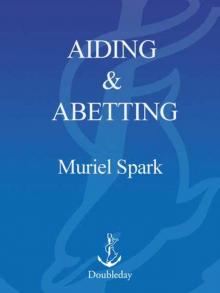 Aiding and Abetting
Aiding and Abetting The Golden Fleece
The Golden Fleece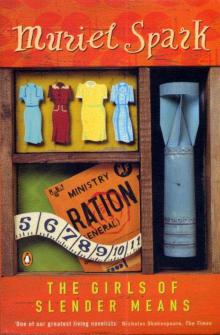 The Girls of Slender Means
The Girls of Slender Means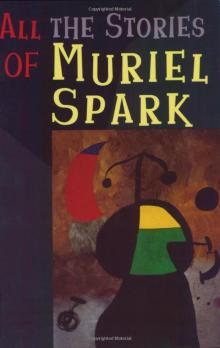 Alice Long’s Dachshunds
Alice Long’s Dachshunds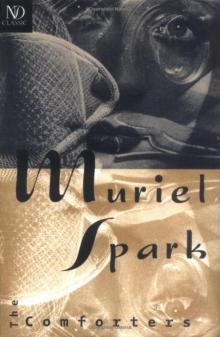 (1954) The Comforters
(1954) The Comforters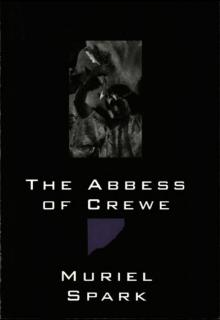 The Abbess of Crewe
The Abbess of Crewe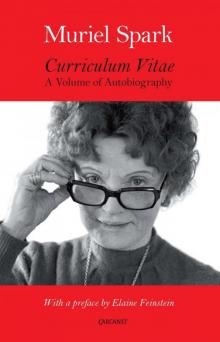 Curriculum Vitae
Curriculum Vitae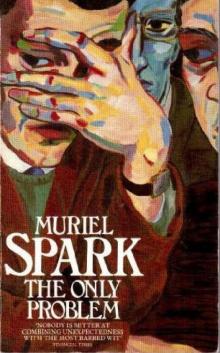 The Only Problem
The Only Problem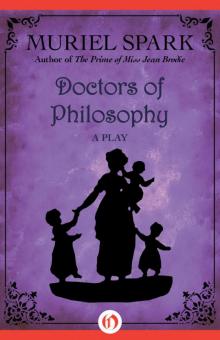 Doctors of Philosophy
Doctors of Philosophy